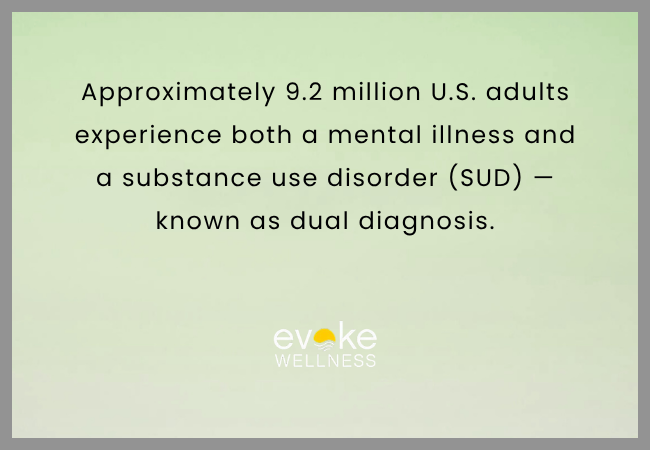Recovery from addiction is rarely a straight line. It’s often complicated by emotional distress, unresolved trauma, or underlying mental health conditions. Many individuals struggling with substance use also face challenges such as depression, anxiety, PTSD, or bipolar disorder. When these co-occurring disorders go untreated, they can sabotage recovery efforts and perpetuate a harmful cycle. That’s where inpatient rehabilitation becomes a lifeline—providing a structured, intensive environment designed to support both mental health and sobriety.
At Evoke Wellness at Cohasset, we understand that healing means addressing the whole person, not just their addiction. Inpatient rehab is uniquely positioned to provide this comprehensive care, offering both safety and stability during the most vulnerable stages of recovery.
The Need for Integrated Treatment
Mental health and substance use disorders are often intertwined. In fact, many individuals turn to substances in an effort to self-medicate symptoms of anxiety, depression, or emotional pain. But while drugs or alcohol may offer temporary relief, they ultimately worsen mental health symptoms over time, leading to increased isolation, instability, and hopelessness.
This is why integrated treatment—the kind provided in inpatient settings—is so crucial. It ensures that mental health care is not treated as an afterthought but as a central part of recovery. By addressing both issues simultaneously, individuals are given the tools and insight they need to heal from the inside out.
An inpatient program doesn’t just help individuals stop using substances; it gives them the foundation to rebuild their lives with a renewed sense of purpose and clarity.
Structure and Stability: Foundations of Recovery
The early stages of sobriety can be some of the most emotionally turbulent. Individuals may experience withdrawal symptoms, mood swings, cravings, or psychological distress. This period often requires professional supervision and around-the-clock care. That’s why enrolling in a Residential Treatment Center in Massachusetts is often the safest and most effective first step for individuals beginning their recovery journey.
Inpatient rehab provides a controlled environment, free from external triggers and temptations. The structure of a daily schedule—consisting of therapy sessions, medical support, wellness activities, and peer interactions—helps reduce anxiety and fosters a sense of routine. For many, this is the first time in years they’ve experienced consistency and calm.
In addition to providing safety, inpatient programs offer a place where individuals can be vulnerable without judgment. Trained staff and mental health professionals offer emotional support, helping patients navigate the complex feelings that arise in early recovery. This consistent support creates a therapeutic alliance, one of the strongest predictors of positive treatment outcomes.
Comprehensive Therapeutic Support
One of the core benefits of inpatient rehab is access to a variety of therapeutic modalities. These approaches are tailored to meet each client’s needs, especially when they are dealing with both addiction and mental health conditions.
Cognitive Behavioral Therapy (CBT), Dialectical Behavior Therapy (DBT), trauma-informed therapy, and group counseling sessions are staples of most inpatient programs. These therapies target negative thought patterns, teach emotional regulation skills, and create healthier ways to cope with stress.
Being part of an Intensive Inpatient Program in Massachusetts means more than just attending therapy—it means being immersed in a therapeutic environment every moment of the day. Therapy doesn’t end when a session is over. Instead, each interaction with staff or peers can become an opportunity to learn, reflect, and grow.
By living onsite and receiving intensive care, clients gain deeper insight into their triggers, learn to manage their emotions more effectively, and begin the critical work of trauma resolution.
Medical Support for Mental Health and Withdrawal
Many individuals who enter inpatient rehab are not just struggling emotionally—they are also physically dependent on drugs or alcohol. Detox can be dangerous, especially without medical supervision. Symptoms of withdrawal may include anxiety, tremors, hallucinations, seizures, or even cardiac complications. For those with co-occurring mental health issues, the risks are even greater.
Participating in Medical Detox Programs in Massachusetts ensures that withdrawal is handled with the utmost care. Medical professionals can monitor vital signs, manage symptoms, and offer comfort medications when needed. In some cases, mental health medications may be introduced to help stabilize mood or prevent relapse into a psychiatric crisis.
This is particularly vital for individuals with dual diagnoses. Detoxing without addressing the psychiatric component can lead to worsened symptoms or immediate relapse after discharge. That’s why a medically supported detox—followed by comprehensive psychiatric care—is so critical to long-term recovery.
Once detox is complete, clients transition directly into the therapeutic phase of rehab. This continuity prevents gaps in care and reinforces the connection between physical wellness and mental health stability.
Peer Community and Shared Healing
Isolation is a hallmark of both addiction and mental illness. Many individuals enter rehab feeling completely alone in their struggles. But one of the most powerful aspects of inpatient care is the opportunity to connect with others who understand.
Sharing space with peers who are on similar journeys offers validation, encouragement, and accountability. Group therapy becomes a space where individuals can express themselves, learn from others’ experiences, and begin to trust again.
Community-building activities—like art therapy, mindfulness groups, yoga, and peer support meetings—further strengthen this sense of connection. These relationships are often cited as one of the most meaningful aspects of inpatient treatment. They help individuals feel seen and supported and remind them that they are not defined by their struggles.
Life Skills and Aftercare Planning
Mental health recovery doesn’t end when the residential stay is over. Long-term success depends on the ability to apply the tools learned in treatment to daily life. This is where life skills training and aftercare planning become essential.
Inpatient rehab provides time and space to rebuild daily habits—nutrition, sleep hygiene, financial planning, communication, and emotional self-regulation. Clients are encouraged to create a realistic plan for maintaining sobriety and mental wellness after discharge.
Staff at a Mental Health Treatment Center in Massachusetts work closely with clients to identify potential challenges and prepare them for re-entry into the world. Whether it’s helping someone find outpatient therapy, support groups, housing assistance, or vocational training, aftercare plans are tailored to the individual’s specific needs and goals.
This transitional support bridges the gap between treatment and real-world living—minimizing the risk of relapse and empowering clients to reclaim their independence.
Why Choose Us?
At Evoke Wellness at Cohasset, we believe in personalized, compassionate care that honors the complexity of each individual’s journey. Our treatment approach is rooted in evidence-based practices, delivered in a healing environment that prioritizes safety, respect, and dignity. For those seeking a Luxury Rehab Center Massachusetts, our facility offers modern comforts in a peaceful setting—creating the ideal backdrop for emotional and physical healing.
Our team of experienced clinicians, therapists, and medical professionals are dedicated to guiding individuals through every phase of recovery. Whether you’re struggling with addiction, mental illness, or both, we are here to support your transformation.
Conclusion
Inpatient rehab is more than just a place to get sober—it’s a sanctuary for healing the mind, body, and spirit. It provides the structure, safety, and clinical expertise needed to treat both mental health disorders and substance use simultaneously. At Evoke Wellness at Cohasset, we are committed to helping individuals rediscover their strength, reconnect with their purpose, and reclaim their lives.
If you or someone you love is ready to begin the journey to lasting recovery, don’t wait. Call us today at 866-931-6429 to learn how our team can support you at every step.
Frequently Asked Questions (FAQs)
What is inpatient rehab and how does it support mental health?
Inpatient rehab provides 24/7 care in a structured setting where individuals receive therapy, medical support, and daily routines that reduce stress and support emotional healing. This intensive environment is especially beneficial for people managing co-occurring mental health disorders.
How is inpatient rehab different from outpatient treatment?
Inpatient rehab requires individuals to live at the facility full-time, offering constant supervision and a distraction-free environment. Outpatient treatment allows individuals to live at home and attend therapy sessions during the day or evening. Inpatient care is typically recommended for those with severe addiction or dual diagnosis.
Can I receive treatment for both addiction and mental health issues at the same time?
Yes, many inpatient rehabs—including Evoke Wellness at Cohasset—specialize in treating co-occurring disorders through integrated care plans. Treating both conditions at the same time significantly improves long-term recovery outcomes.
How long does inpatient rehab usually last?
Inpatient programs can vary in length depending on individual needs, but common durations are 30, 60, or 90 days. Some may require extended care to ensure full stabilization and readiness for life after treatment.
Will I receive therapy every day in inpatient rehab?
Yes, inpatient rehab typically includes daily individual or group therapy sessions. These may involve behavioral therapies, trauma work, relapse prevention planning, and life skills development.





